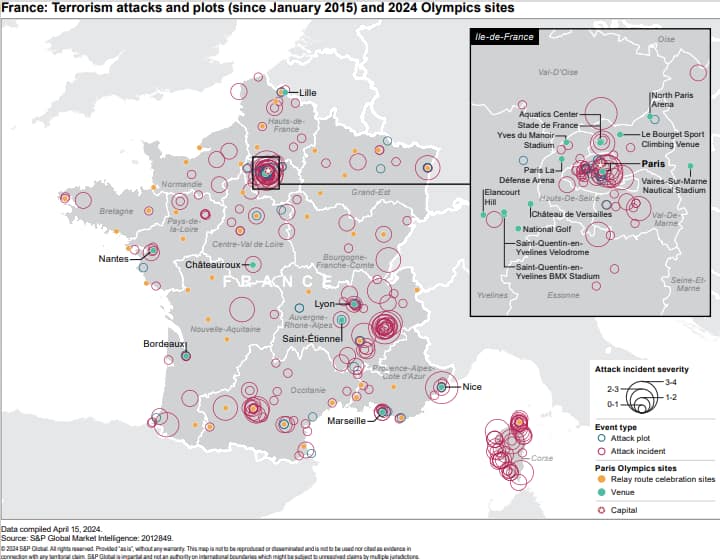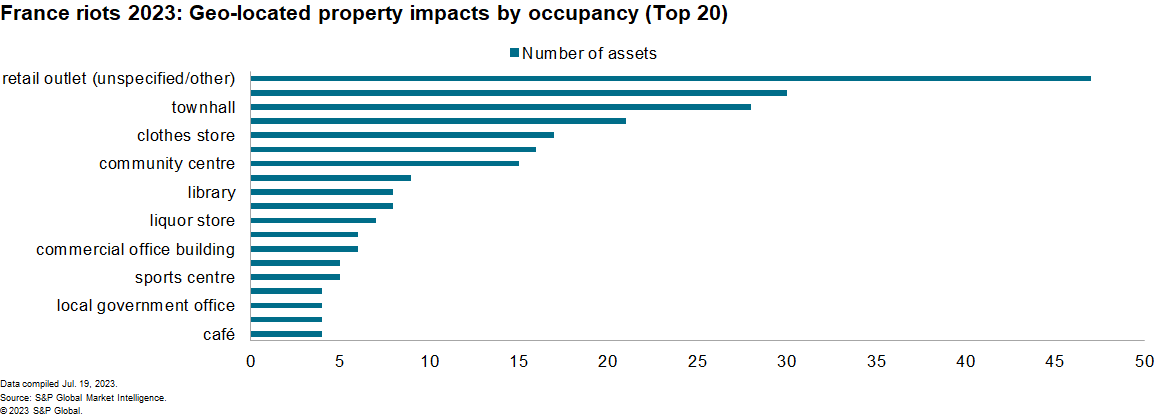Featured Topics
Featured Products
Events
S&P Global Offerings
Featured Topics
Featured Products
Events
S&P Global Offerings
Featured Topics
Featured Products
Events
S&P Global Offerings
Featured Topics
Featured Products
Events
Financial and Market intelligence
Fundamental & Alternative Datasets
Government & Defense
Banking & Capital Markets
Economy & Finance
Energy Transition & Sustainability
Technology & Innovation
Podcasts & Newsletters
Financial and Market intelligence
Fundamental & Alternative Datasets
Government & Defense
Banking & Capital Markets
Economy & Finance
Energy Transition & Sustainability
Technology & Innovation
Podcasts & Newsletters
BLOG — May 20, 2024
By Bibianna Norek and Hugo Foster
Learn more about our data and insights
The Paris 2024 Olympic Games, which begin July 26, pose significant security risks. The Olympic events will take place in 36 locations across France, as well as one in Tahiti, and are expected to attract about 13.5 million people. From terrorism and protests to cyberattacks, we examine the challenges faced by the organizers and the measures being taken to ensure the safety of athletes and spectators.
Terrorism
One of the most concerning threats is the risk of Islamist terrorist attacks. The recent history of terrorist attacks targeting sporting and cultural events in Europe and Russia, combined with foiled attempts reported by the French government, indicates a high risk of such attacks being planned or attempted during the Olympic Games.
The French government raised the terrorism threat level to the highest on the government's scale following the Crocus City Hall attack in Moscow on March 22, which was claimed by a branch of Islamic State. This emergency measure allows the government to temporarily deploy up to 7,000 troops on domestic security duties. The government is unlikely to lower the terrorism threat level ahead of the Games, especially as other sporting competitions will be organized prior to the Olympics, notably the Tour de France cycling competition (June 29-July 21).
The high level of security in place at and around the Olympic venues is likely to motivate individuals or small cells intent on conducting an attack during the Games to attempt to target other locations associated with the Olympics, including fan zones, queues outside of venues, hotels, restaurants and transport hubs.

Protests
We see a high risk of protests that will disrupt travel and access to events across the country. Various interest groups, including collectives opposing the holding of the Olympic Games, environmental activist groups, anti-establishment groups, and trade unions with precedent of mobilizing, have expressed intent to disrupt the Games. One anti-Olympic collective has issued calls for activists to sign up as volunteers for Paris 2024 and disrupt the organization of the Games either by failing to show up, going on strike, or staging unannounced protest actions on the day. This has prompted French authorities to initiate a vetting process for volunteers to reduce the risk.
Travel disruption and protest and property damage risks will remain very high in the lead-up to and during the Olympics. Various interest groups will likely attempt to capitalize on the media exposure of the event and the Olympics, offering an opportunity to put pressure on organizations and the government. Disruption to travel and access will be the main risks posed by protests, with demonstrators more likely to rally in central areas of Paris in the proximity of Olympic venues. In such cases, the police response to dislodge activists will add to congestion and risk of altercations, yet also mitigates risk of prolonged disruption.

Activist groups have threatened to target the offices of companies sponsoring the Games, including by breaking into premises. If these threats were to materialize, they would mainly involve vandalism attacks, attempted occupation, or blocking of access to their offices or retail premises.
Youth riots — mainly triggered by incidents involving the police and alleged police use of excessive force/perceived discriminatory action — would be likely to mainly impact venues in peripheral areas of host cities, including the Paris suburb Saint-Denis, home of the Stade de France. The unprecedented mobilization of police officers nationwide during the Games is likely to mitigate their impact and spread within a city, should they occur.
Israel's war against Hamas in Gaza will very likely serve as motivation for pro-Palestinian protesters and for counter protesters. While these are likely to remain mostly peaceful, there will be a moderate risk of altercations and deployment of riot police. Significant developments in the war would encourage greater turnout and potentially more forceful interactions between protesters and police.
The Olympic Torch Relay in May will be at a very high risk of being targeted for disruption by demonstrators attempting to stop the convoy on various locations along the route, although security provision would reduce the likelihood of activists being successful in causing prolonged disruption.
Cyberattacks and sabotage
The ongoing Russia-Ukraine war also raises concerns about cyberattacks targeting critical national infrastructure, public and private companies, and assets linked to the Olympics and the French government. Deniable sabotage — including targeting railway lines, airports, optic fibers, the power grid, and emergency services —
The dismissal by the Sports Arbitration Tribunal of Russia's appeal against its Olympic suspension has likely exacerbated the interests of state-aligned cyber threat actors as well as individuals to carry out cyberattacks. The Paris Olympic Games' Organization Committee estimated that the number of cyberattacks conducted during the Paris 2024 Olympics will probably be 10 times higher than during the previous Olympic Games.
To address these security risks, the French authorities are implementing comprehensive measures. Approximately 35,000 police officers and gendarmes, supported by 18,000 military personnel and 2,000 foreign police officers, will be deployed to ensure the safety of the event. The organizers are also working closely with cybersecurity experts to protect against cyber threats and potential disruptions.
Listen to our experts speak on our weekly podcast
This article was published by S&P Global Market Intelligence and not by S&P Global Ratings, which is a separately managed division of S&P Global.